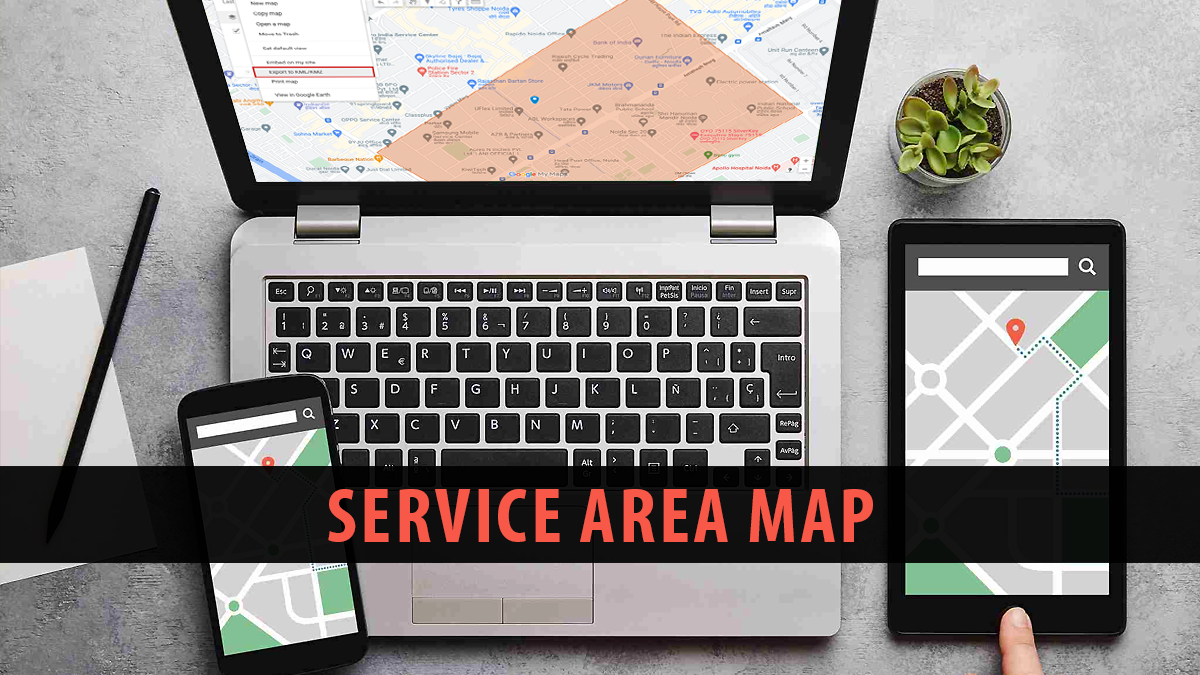Local SEO is grounded in carefully refined content marketing. One key to success is incorporating Google Maps into your strategy. This helps search engines recognize your business as relevant for regional keywords, improving your ranking in local organic search. Whether optimizing a local directory, running local ads, or enhancing your Google My Business listing, integrating Google Maps is essential for maintaining a strong presence in local search results.
Geo targeted content is crucial for establishing a strong foundation, producing relevant SEO content, and ensuring your business appears in local searches. Key activities include localizing web pages with regional keywords and publishing updates on business-related topics. High-quality, localized content, paired with Google Maps integration, will boost your business’s online visibility, increase user engagement, and drive conversions, all contributing to an effective local SEO strategy.
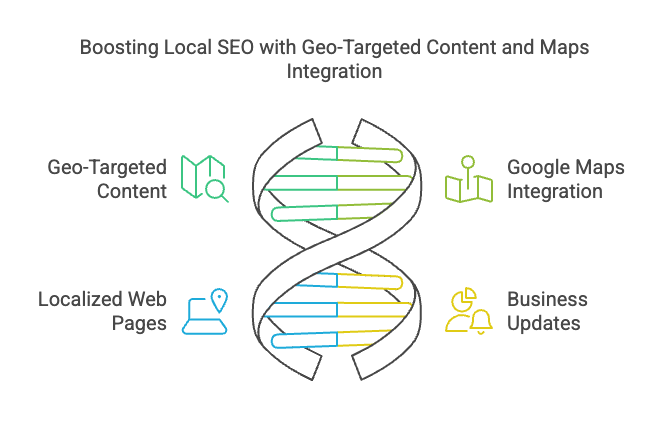
By leveraging Google Maps and focusing on local search terms that align with your services, your business will gain more visibility and attract more local traffic. This approach is vital for any business aiming for long-term success in local SEO.
Choosing The Right Keywords For Geo-Targeted SEO Content
A solid local content marketing strategy begins with choosing the right keywords. These keywords will direct the content you create and help boost your site’s authority with Google and other search engines.
Quality content increases the chances of being shared and linked back, strengthening your domain authority and improving local search rankings.
Boost your local rankings by hiring experienced Google Maps SEO marketing services that specialise in optimising your business for maximum visibility in your target area.
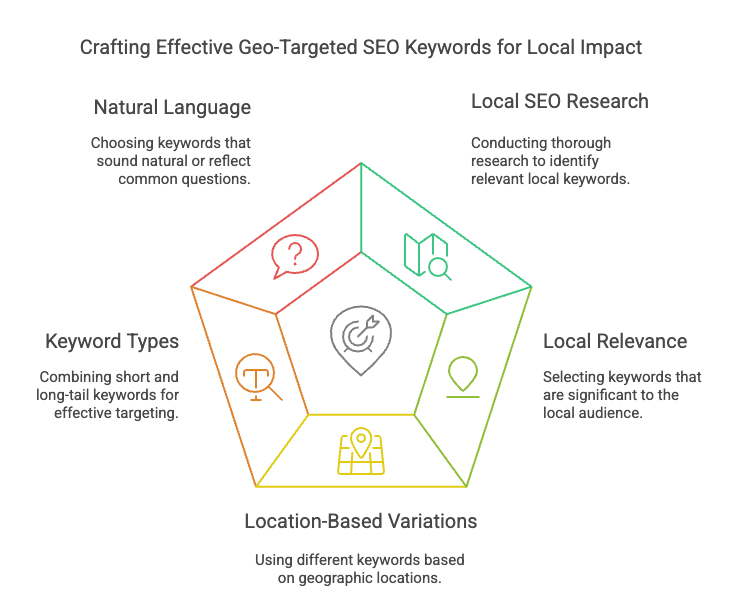
Here’s how to pick the right keywords for geo targeted content that supports local SEO:
Do In-Depth Local SEO Keyword Research
Keyword research is the core activity in any successful local SEO content strategy. It’s the best way to enable businesses to identify the search terms and phrases that customers who want a local product or service would use. With this, they ensure that they optimize the content so it will come in front of the target audience, improving visibility on local search results. Businesses are likely to pull local customers focusing on high-traffic and relevant keywords.
A good keyword research tool can help identify relevant local keywords. These tools reveal the most popular search queries, regional terms, and variations that customers might use. By focusing on specific geographic areas and local landmarks, businesses can fine-tune content and target a more precise audience. Local-specific terms, including city names or neighborhood references, can greatly improve a site’s relevance in search results.
Businesses also need to focus on long-tail keywords. These keywords are less competitive and cater to focused intent. Analyzing competitors’ keywords will provide insights into the local market and help identify hidden opportunities. In this way, businesses can create a balanced mix of short—and long-tail keywords to create an effective local SEO strategy.
Target Keywords That Matter Locally
When conducting keyword research, one should focus on location-based terms to connect with a local audience. This means targeting geographically specific keywords that will make your business appear in local searches, thus increasing the chances of potential customers finding your products or services. Using location-specific phrases increases the probability of attracting relevant traffic from users within the targeted area.
Always include your city, village, or area in your keywords. Local terms, which include known points of interest and other locales or regional slang words, target users who seek businesses around their locations. Keywords focused on the location that search engines will connect consumers with are close options, determining your SEO technique’s success.
For instance, in targeting a fitness-related business, terms such as “gyms near downtown” or “fitness centers in [specific city]” will ensure the right people are being reached. With local search optimization, businesses can ensure they appear to geographically close consumers, boosting rankings and engagement. Localization can significantly improve visibility and drive more targeted traffic to the website.
Try Using Different Location-Based Keywords
Expanding a local SEO keyword strategy essentially uses variations of place names to capture many possible search queries. By adding abbreviations, nicknames, and especially local references, businesses are more likely to rank for multiple location-based terms, providing better coverage on how people refer to an area and extending visibility in search results.
For example, a company that targets an area such as Los Angeles might use common abbreviations, like “LA,” larger regional terms, like “SoCal,” or specific neighborhood names. This approach to local SEO is much more holistic, as people are likely to search for businesses in that area in many ways.
La Colloquialisms specific to a local area also enhance local SEO efforts. UsVariation, such as “Hollywood,” “Venice Beach,” or “Santa Monica,” connects the business with relevant local searches. This targeted approach helps enhance the relevance of the business’s online presence, ensuring it appears in a wide array of local searches.
Combine Short And Long-Tail Keywords
A smart SEO strategy must integrate a mix of short-tail and long-tail keywords to target various search preferences. Short-tail keywords are broad but capable of attracting a high search volume; however, they tend to be extremely competitive, making it tough to rank for them. Long-tail keywords tend to offer more precise targeting and often catch users who are further along in their buying journey, with a greater potential to convert.
Although necessary for broad reach, short-tail keywords are too general and face huge competition from many other sites, making ranking even more challenging, especially for smaller or newer sites. Long-tail keywords will address the problem by narrowing the audience, attracting qualified visitors searching with intent, and hence raising the chances of getting closer to users who are about to buy.
For instance, one can combine a broad term like “books” with a more detailed phrase, such as “best independent bookstores in New York.” This approach ensures that the site will capture both the volume of traffic from the broad term and the more niche and targeted traffic from the longer phrase. Thus, it will achieve a well-balanced SEO strategy to cover a larger audience without depending too much on very competitive keywords.
Select Keywords That Sound Natural Or Ask Questions
Voice search is rapidly gaining momentum, especially in local searches. This means that how people use devices will also change, as they’ll now use voice assistants like Siri and Google Assistant. There’s more natural, conversational language instead of those short, fragmented queries in types. And because of this shift, businesses should think twice about their SEO strategy, especially in the light of local search optimization.
To optimize for voice search, use question-based keywords that reflect the natural language people use when talking. For example, phrases like “Find the nearest coffee shop open late” or “Locate a pharmacy that delivers prescriptions” are more likely to match how people speak in voice search. Using these long-tail keywords will make businesses better suited to their users’ intent and, therefore, likely to rank higher in voice search results.
Mobile optimization is essential for voice search success because voice queries are mostly made on mobile devices. A mobile-friendly website will provide a better user experience, which can translate into higher rankings. Lastly, local SEO, by creating targeted location-based terms, can help businesses rank in voice search results relevant to their geographic area, enhancing local search results.
Ways To Add Local Keywords To Your Website
Once relevant keywords for a local SEO content strategy are identified, the next step is strategically using them throughout the website. Keywords need to be used organically to not hurt readability and engagement. Overuse or forced placement of keywords can harm both search rankings and user experience. The balanced and thoughtful approach will ensure that the website stays optimized while delivering value to visitors.
Optimization starts with the existing service or product pages where relevant local terms can be applied. For example, a landscaping service would contain terms like “lawn care services in Austin” or “Austin backyard design.” This makes the content more location-specific and will appeal to the audience and search engines, enhancing its visibility.
Creating new content is important for covering additional local keywords. Landing pages for special services or geographic areas greatly improve local targeting. For example, an exterminator can create pages that read “Rodent Removal in Dallas” or “Dallas Termite Inspection.” Such targeted content attracts people searching for those specific services in that area and aligns with their needs.
Blogs are another great way to incorporate local keywords. Posts like “Seasonal Lawn Care Tips for Houston” or “Top Ways to Winterize Your Home in Chicago” can naturally include the keywords while providing value to the reader. Posts engage an audience, establish expertise, and improve rankings for location-based searches.
Customer reviews that include local details can enhance local SEO efforts. Reviews like “Great roofing repair services in Atlanta—quick and reliable!” use location-specific terms. Featuring these reviews on the website increases credibility, improves trust among users, and raises the website’s relevance in local search results. All these strategies build a solid foundation for optimizing local visibility.
Make Your Website Content Relevant Locally
The first step in building an effective local SEO content strategy is to optimize your web pages with local search terms that potential customers in your area are actively searching for. This requires in-depth keyword research on terms relevant to your business and location.
Tools such as Semrush, Ahrefs, or Google Keyword Planner are perfect for finding location-based keywords that will give you an idea of what the users in your area are searching for. These tools also give you data on the search volume, competition, and trends, which enable you to choose the best keywords to get traffic to your site.
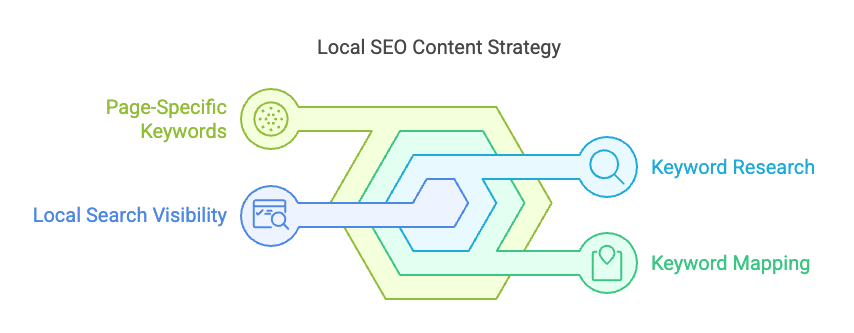
For instance, if you have a gym in Miami, you can apply these tools to find out keywords such as “best gym in Miami” or “Miami fitness center.” After getting the keywords, map them to the corresponding pages of your website:
- Home Page: “Miami gym and fitness center” The keyword “Miami gym and fitness center” should be at the top of the home page, as it encompasses variety in terms of services including strength training and cardio; however, this would target those seeking services within the Miami vicinity.
- Personal Training Page: “personal training Miami” The keyword “personal training Miami” on the personal training page can be incorporated to bring out the services of having tailored workout plans by certified trainers for individual fitness journeys while targeting individuals seeking personal training in Miami.
- Yoga Classes Page: “Miami yoga classes” The yoga classes page should have “Miami yoga classes” on it to attract users that are looking for local sessions and possibly the types of classes they may be able to take in terms of their schedule, as well as the expert experience instructors have in the Miami area.
Therefore, your website will appear in a relevant local search, helping potential customers find you easier.
Improve Your Local Web Pages
After selecting your target keywords, the next step is to optimize your content around those terms.
Follow these on-page SEO guidelines:
- Keyword in URL: Users and search engines need to know the content of your page by including your target keyword in the URL. A clean and descriptive URL improves your site’s SEO by making it easier for search engines to index. Although an exact match is not required, relevant keywords improve visibility and relevance.
- Keyword in Title Tag: The title tag must clearly state the page’s content while including the target keyword. It is one of the first things the user sees in search results, so it should be compelling and concise, preferably under 60 characters. A well-crafted title increases the page’s ranking and attracts clicks from users searching for similar topics.
- Clear Meta Description: A meta description is a short pitch for your page so search engines and users can determine its relevance. It should be as short as possible, ideally under 160 characters. It should naturally contain the target keyword and be compelling enough. A well-crafted meta description increases click chances from search result pages.
- Keyword-Focused Content: Create body content naturally that infuses your target keyword without stuffing it in. Informative, engaging, and value-driven content will keep the users on your page. When your content can answer questions or deliver valuable information, it improves your ranking for SEO while making the reader happy and satisfied.
- Descriptive Alt Text: Use alternative text for images. This will make your website more accessible to those with visual impairments and help search engines understand what the image is about. Write descriptive alt text that includes relevant keywords, improving SEO and providing context for the users of each image on the page.
- Use Structured Headings: Headings (H1, H2, H3) help organize content and make it more readable and scannable for users and search engines. H1 is the main page title, H2 is sections, and H3 is subsections. Properly structured headings improve SEO by clarifying the content’s hierarchy and relevance to search engines. Also implement schema markup for local SEO and ensure fast page load speed.
- Internal Linking Strategy: Internal linking strengthens your site’s structure and helps search engines discover more pages. The relevance of content on your website also keeps users engaged, guides them to related pages, and decreases bounce rates. Well-placed internal links also improve SEO by spreading link equity across your site’s pages.
Ensure that each page is optimized for local keywords that are unique to avoid overlap. That means giving a different keyword to every page so that you don’t have internal competition, which can negatively affect your rankings. When you target one keyword per page, you are maintaining content relevancy, which is easy for search engines to understand and rank.
Select a keyword that accurately reflects what’s on the page; ensure the keyword aligns with your intent of content to the needs of your targeted audience. Select a keyword that accounts for factors like search volume, competition, and relevance towards attracting the right visitors while increasing your page’s chances of being noticed.
Create A Comprehensive Contact Page
Your contact page gives users and search engines vital information about your business. A well-written contact page can increase your local presence and make it easier for people to get to you.
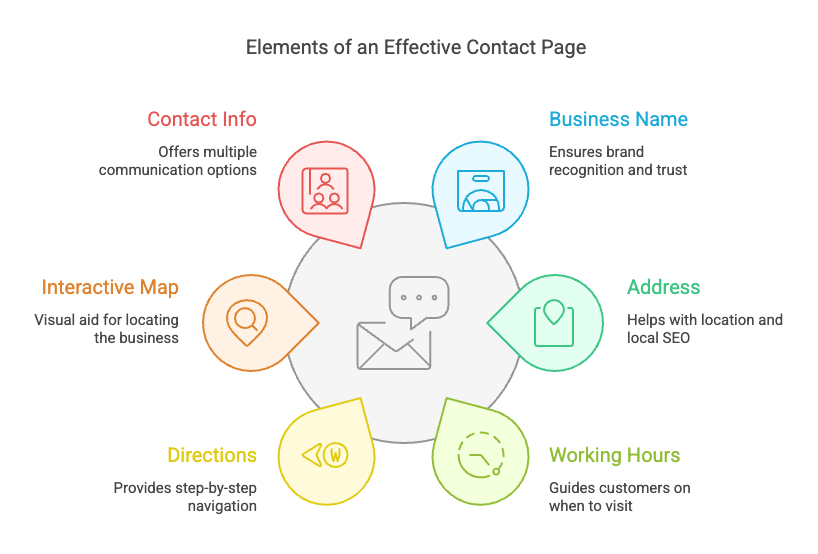
A bad or unoptimized contact page can miss the chance to reach out to your local audience. Make it more effective by including:
- Business Name: Your business name is your identity, so ensure users and search engines easily recognize your brand. Display it on the contact page to build trust and keep it consistent throughout all online and offline platforms.
- Correct Business Address: Use your full and exact address to help users locate your business easily. Providing city and state information will also improve your local search ranking, allowing nearby customers to find your business more easily.
- Clear Working Hours: Clearly list your working hours so that users know when to visit your business. Accurate timings will manage customers and prevent frustration. They will know when best to visit or contact you.
- Directions to Premises: Provide clear, step-by-step directions to your location to help visitors find their way to you. Providing information about nearby landmarks or public transport also makes it easier to find your location and ensures a smooth user experience.
- Interactive Map: Add an interactive map to locate your business easily and visually. Embedded Maps benefits customers to plan their visits and informs search engines about your physical presence.
- Contact Info: Add your phone number, email address, and social media contacts to give customers the option of how to contact you. This will build their confidence in approaching your business.
- User-Friendly Inquiry Form: Add a simple, intuitive enquiry form to encourage people to contact you easily. Forms streamline communication by collecting all of the important details, allowing for quick and effective responses to user queries.
These elements not only improve the user experience by making your business accessible but also strengthen your local SEO strategy. Google can better recognize your location, enhancing your visibility in local search results and driving more foot traffic to your business.
Write Geo-Targeted Content
Blogs within websites allow for the great space of posting local content while connecting with users in more personalized ways. They transcend standard web pages that reach audiences actively seeking information within localized contexts. This enhances businesses’ online presence, bringing to light relevant content that speaks to people’s specific interests and needs within the localized area.
Focusing on local events, seasonal trends, or community projects can help blogs really connect with the target audience. Writing about such topics grabs attention and makes the blog a go-to source. Updates on local businesses, scholarships, or regional news strengthen the connection with the community and demonstrate relevance.
More ways to engage include industry-specific lists or guides focused on the region. Some ideas include writing “Top Attractions in [City]” or “Local Resources for Small Businesses,” among other similar content that has direct applicability for readers. This is of value both to locals and tourists alike, strengthening connections between readers and writers.
Localized blogging can also help with niche targeting. A company expanded its area of operation by posting material on sector-specific trends appropriate for a region’s sector. By aligning its content with regional interests, it successfully garnered a larger audience and bolstered its presence in that regional market.
Submit Guest Posts On Local Publishers
Guest blogging is a great way to boost website traffic and improve local SEO. Writing content for established sites within a specific geographic area helps businesses drive targeted traffic to their sites and possibly improve their search engine rankings. It helps build authority and makes the business a relevant source in its niche, thus immediately driving traffic and benefiting long-term visibility.
Guest posting opportunities are always best found through local business outreach and platforms. Often, these sites already host a ready-made, receptive audience that businesses can then draw upon without having a link directly to their own site. In doing this, businesses can build meaningful relations that help drive consistent, steady local traffic and grow online presence in general.
For businesses looking to target a specific local market, guest posting on local websites can increase visibility within the community. When featured on respected local platforms, the business gains access to a highly relevant audience that is already interested in local content. This localized exposure can significantly drive engagement from users in the business’s service area.
Focusing on those local authoritative guest posting websites will always increase the company’s visibility online without resorting to backlinks. All these opportunities are done perfectly to create a brand and can be attributed directly to a more impactful local SEO strategy. Consistency in doing this helps establish trust among the community to maintain presence.
Share Details About Local Events And Things To Do
Your local community probably discusses daily activities and events. People are looking for this kind of content, and it is a way to reach their interests. You can leverage your website’s content on local events to connect well with your audience and drive traffic to your site.
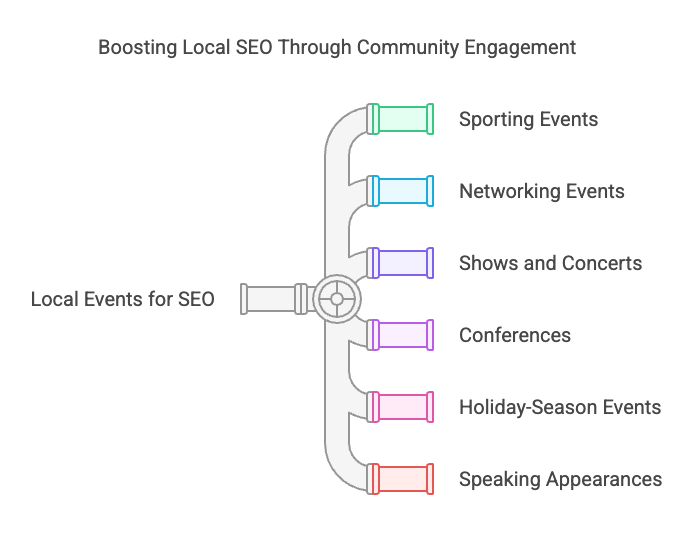
If a major conference, concert, or sporting event is about to happen, you can easily create a local traffic movement to your website. These events often spur much buzz on social networks and local forums and are excellent opportunities to create content and, hence, boost SEO. By enhancing the site for relevant keywords, you can attract more eyeballs who are searching through it.
Local topics to notice are:
- Sporting events: Sports from the local teams or the most massive events, such as marathons, football games, or tournament nights, create an influx of excitement and focus that helps to tap into searches based on community-based inquiries regarding updates.
- Networking events: Business expos, conferences, and local meetups are great places to make connections between professionals. Often, these events command a large amount of local interest, generating opportunities to create relevant content for a targeted audience.
- Shows and concerts: In most local discussions, shows, concerts, and theatre performances are always the most discussed topics. This can help attract attendees or fans who want to know ticket details, time schedules, or reviews.
- Conferences: Industry summits, community gatherings, or conferences are ideal opportunities for local SEO. They can serve as a basis for content covering event information, scheduling, and speakers, ensuring that your website aligns with searches.
- Holiday-season events: There are strong potential ties to local holidays, seasons where these festivals occur, seasonal festivals, and themed-type events like Halloween or the summer fair.
- Speaking appearances: Whenever notable or famous speakers visit your area for seminars, workshops, or talks, people become inclined toward them. Recording their events increases local activity and pushes traffic toward locals who want information.
- Local ceremonies: Community parades, award ceremonies, or cultural celebrations are major local events that generate buzz. Covering these events or their outcomes can attract people looking for updates, making them valuable content sources.
Tapping into these local discussions allows you to cater directly to your community’s interests and position your site as a valuable resource for local information.
Build Your Local Following On Social Media
A third of the world’s population uses social media every year; many of those are local to your community. All things being equal, if Facebook, Instagram, and TikTok are so mainstream that they are now the norm, your target consumers are likely on these services. Social media provides the unparalleled opportunity to connect directly to an audience where they already spend time.
Engage with customers who may be interested in your service and expand your local market by consistently posting about your blog and website content across platforms. Use available formats such as stories, reels, and carousel posts to make the content more engaging. Also, consider joining local Facebook and LinkedIn groups so that you can target your users directly within the specific area where they would be interested in what you have to say about your business.
To communicate with your target consumers, share content that resonates with their location and interests. For example, create posts featuring landmark places, events, or currently trending community topics. Monitor what is trending and engaging in your local community by following event pages, businesses, and influencers. Using local-related hashtags will increase exposure even more.
If you are a digital marketer from Denver, Colorado, you may opt for creating a blog on a local business expo or a networking event that’s upcoming in town. Share that post using good visuals and pertinent hashtags. Increase engagement by sharing that piece in Facebook groups based out of Denver and/or in LinkedIn communities in your network. You can also collaborate with local influencers or businesses to amplify the reach of your content, bringing in even more traffic to your blog or website.
How To Avoid Local SEO Mistakes
Effective content creation is key to driving local traffic. Even the best content won’t be noticed if it cannot be found. To maximize local SEO efforts, avoid these common pitfalls.
Key mistakes to avoid:
- Ignore local keywords: In this case, using local keywords in your content increases search engine visibility. Use Google Keyword Planner or Ahrefs tools to find high-impact local search terms. Ensure these keywords occur organically within your content, title tags, meta descriptions, and headings to raise their relevance for local searches.
- Failure to use customer reviews: Get satisfied customers to post reviews to help improve your online reputation. Positive reviews boost your credibility and, by extension, improve your local rankings. Engage in the process of responding to positive and negative reviews.
- Inconsistent NAPW information: Your Name, Address, Phone Number, and Website should be consistent on all the online platforms. Inconsistent NAPW data can confuse search engines and customers, affecting your rankings. Use tools like Moz or Yext to manage and track your business’s information across various sites.
- Lack of directory listings: List your business in local directories to increase online presence. Popular local directories such as Yelp, Yellow Pages, and BBB can help improve your visibility and search ranking. To attract more attention, complete your profiles fully, including business hours, photos, and services.
- Unclaimed Google Business Profile: Claim your Google Business Profile. This will help attract more local customers. If everything is optimized properly and detailed, your chance of standing out in local search engine results and Google Maps grows. Keep updating with complete and accurate information, great photos, posts, promotions, and so on; drive foot traffic to your doorstep.
Addressing these issues and best practices can easily improve your local SEO, bringing more targeted traffic to your website. Regularly auditing your local SEO strategy keeps your business competitive and visible in the local market.
Conclusion
To build an effective geo targeted content plan, you must create high-quality, relevant local content that engages your audience while following best SEO practices. Start by conducting thorough keyword research, focusing on local search terms that include geographic keywords and location-based queries. Optimize your content using these keywords naturally in titles, headings, meta descriptions, and body content.
A key part of this strategy is ensuring your website is mobile-friendly, quick to load, and easy to navigate. Additionally, claim and optimize your Google My Business listing, and encourage customers to leave reviews. Integrating Google Maps into your local SEO efforts can boost visibility, as it helps customers find your business location easily. Create content around local events, news, or industry trends, and include Google Maps to make it easier for users to locate these events or your business.
By leveraging Google Maps and other tools, you can enhance your local SEO performance and attract more customers from the region. Use analytics tools to monitor performance and adjust your strategy as needed for long-term success in local SEO.
FAQs
Why is local SEO important for my business?
Local SEO is crucial for businesses that serve specific geographic areas because it helps you reach the right audience in your locality. It ensures that potential customers can find your business more easily when they search for products or services in your area. Without a strong local SEO presence, your business risks losing visibility to competitors, especially in an age where more consumers rely on search engines for location-based recommendations.
What types of content should be included in a local SEO plan?
Your local SEO content plan should include a mix of content types, such as local blog posts, city-specific landing pages, testimonials from local customers, and case studies featuring work done in the area. You should also focus on creating location-specific FAQs, directory listings, and event-based content relevant to the local community. Engaging visuals like maps, photos of your business in the community, and videos highlighting your local involvement can further boost your content’s local appeal.
How do local citations affect my SEO content plan?
Local citations play a significant role in local SEO by helping search engines verify your business’s legitimacy and relevance to a specific location. Citations mention your business’s name, address, and phone number (NAP) on other websites, directories, and platforms. When your business is consistently cited across trusted sources, it can improve your local rankings. Ensure that your NAP information is accurate and consistent across all platforms to avoid any negative impact on your local SEO.
How often should I update my local SEO content?
Local SEO content should be updated regularly to stay relevant and maintain strong rankings. Updating existing content to reflect changes in your business, the community, or industry is important. Keep track of local trends, events, and seasonal changes, and adapt your content accordingly. Updating your Google My Business profile, posting new reviews, and refreshing your website with fresh local content can help keep your business visible in search results and engaging to local customers.






